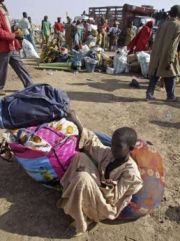Shattered Darfur families mourn lost futures
March 9, 2008 (GUEREDA, Chad) — Three-year-old Hilam screams when medics lift her hospital sheets to examine where shrapnel ripped through her leg during a Sudanese government bombing raid on her Darfur village.
 Doctors say they will have to amputate the limb. Hilam’s sister Kaltouma, 11, has already had her leg amputated above the knee, and a third sister was also wounded.
Doctors say they will have to amputate the limb. Hilam’s sister Kaltouma, 11, has already had her leg amputated above the knee, and a third sister was also wounded.
The girls are among at least 13,000 Sudanese who have crossed the border into Chad to escape Khartoum’s month-old operation near the West Darfur rebel stronghold of Jebel Moon.
“I don’t know what to do. Our house has been burnt and my children have been injured by bullets and bombs. My children are ill and all I want is for them to be better,” said their mother, Ashua Osman Youssouf, as she held vigil at Hilam’s bedside in Guereda hospital in eastern Chad.
Sudan’s army says the month-old operation aims to open up humanitarian access and to chase away Darfur and Chadian rebels.
Witnesses say air raids and Janjaweed militia raids on villages and camps for displaced people in Darfur have killed over 100 people — possibly many more — and left thousands of people camping out on the border short of food and water.
The army denies links to the Janjaweed and says many of those killed were rebels in civilian clothing.
International experts estimates that 200,000 people have died and more than 2 million dispaced since violence flared in the Darfur region in 2003 when mostly non-Arab rebels took up arms against the government, accusing Khartoum of neglect.
Khartoum says only 9,000 people have lost their lives.
“It is impossible for any of us to go back,” said Isaak Abdallah Isaak, sitting just a few metres (yards) from the dried out riverbed which separates Chad from Sudan.
HUNGRY
Isaak was forced to abandon three of his children along with his elderly mother during the panic that followed a joint bombing and Janjaweed raid. He said he struggles to provide enough for his remaining family of nine to eat.
“The Janjaweed expressly destroyed all our food,” he said.
“At the same time as the planes came to bomb, the Janjaweed arrived with matches and started to set fire to things. For six days they did nothing but burn houses and people’s food stocks.”
The month-long wave of attacks followed the harvest, meaning many refugees lost several months’ supply of grain.
“Look,” said Isaak, as he poured coffee-coloured water into a drinking bowl. “This is the dirty water my children must drink. We are still waiting for the aid workers to improve our conditions, we are really suffering.”
During a visit to the border last week, a Reuters reporter saw helicopters criss-crossing Jebel Moon at low altitude, accompanied by muffled booms and clouds of black smoke.
“Those are the same planes which bombed us,” said Idriss Abakar. “We are scared they will come here to bomb us.”
For many returning to Darfur is unthinkable.
Mariam Issak Nassir said she was three and a half months pregnant when Janjaweed attackers forced their way inside her home during a bombing raid and shot her in the leg.
“That night, as I lay injured, I went into labour early. My husband found a donkey to take me to Chad, but when we reached Chad the babies came out dead from the shock. It was twins.”
(Reuters)
